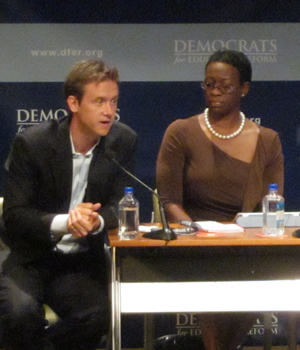Legislators from across the U.S. gathered at the Democratic National Convention Tuesday and discussed the need for unions to be a part of any real education policy changes.

State Senator Michael Johnston (D- Colo.) and State Senator Nina Turner (D- Ohio) at town hall hosted by Democrats for Education Reform.
They also noted that that both unions and politics can get in the way.
A town hall hosted by Democrats for Education Reform showcased feuds that have erupted in many states as legislators have tried to push through a litany of education reforms that unions do not necessarily support – such as the use of student test scores in hiring and firing.
And who has been at the helm of many of these bills? Democrats, traditionally seen as the pro-labor political party.
The town hall in Charlotte comes at a time when DFER’s influence is growing. Founded five years ago, the organization works to elect Democrats committed to making drastic changes to state education policies. DFER attended the Democratic convention in 2008, “but this year brings a bigger audience and stature for the group,’’ the New Jersey Spotlight noted.
Examples of the group’s influence became clear when legislators spoke of what is happening in their states.
Marcus Brandon, a member of the North Carolina State House, was the only Democrat to vote for a 2011 bill that lifted the state’s cap on the number of charter schools that were allowed to open. Brandon lamented the political wrangling that kept charters from being required to provide lunch or transportation to low-income students.
Nina Turner, of the Ohio State Senate, discussed how an education reform bill for Cleveland, a city under mayoral control, was crafted with union input and two Republicans and two Democrats working together.
“We held hands the whole way through,” Turner said of the bill, which includes opportunities for new charters to open and changes to the teacher layoff process.
Teresa Ruiz, the state senator in New Jersey who was a driving force behind a bill that changed teacher tenure, was also able to get the union in her state on board.
“We shifted from calling it a compromise to calling it a collaboration,” Ruiz said. Still, Ruiz noted that the bill didn’t go far enough in her opinion; for instance it does not eliminate the first-in, last-out teacher layoff process.
“There is a level of fear,” she said of legislators who are unwilling to go against teacher union requests. “There is a group that can really make a difference [in re-elections.]”
When the presidents of the country’s two teachers union took the stage in the second panel, though, they were in agreement – as they have been – with the need to eliminate poor teachers to improve schools.
Their presence at the convention comes at a time when the relationship between the union and President Barack Obama has been somewhat frayed, the Los Angeles Times and others have noted. It also comes amid protests of the movie, “Won’t Back Down,” which stars Maggie Gyllenhaal as a single mother trying to get her daughter out of their failing public elementary school.
Randi Weingarten, president of the American Federation of Teachers, has denounced the film for portraying teachers and their unions as stereotypes and objects of blame.
At the Town Hall, both Weingarten and Dennis Van Roekel of the National Education Association spoke of a different subject: the potential for technology and online classes to support education, although they argued that the concept of “school” as we know it, won’t disappear.
“Unless you can make where [students] come from and where they live [equal]… there’s got to be a place where I can go to get what I need to follow my dreams,” Van Roekel said.
John Katzman, an education entrepreneur whose companies include the Princeton Review and 2tor, which partners with universities to provide online classes, envisioned a future of education full of networks of schools, all catering to different learning styles or focuses.
This would extend to union contracts, he said, advocating an end to a “one size fits all” approach to negotiations within a district.
“Our different goals dictate that there are different schools,” he said. “We don’t have to have all schools alike.”



